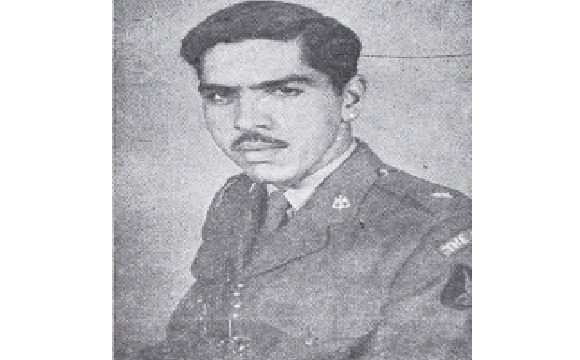
Service No : IC-8196
Place of birth : Mohali Dist (Pun)
Service : Army
Last Rank : Captain
Unit : 5 Guards
Arm/Regt : The Brigade of the Guards
Operation : Op Indo- China war
Martyrdom : November 15, 1962
Captain Amarjit Singh
Captain Amarjit Singh hailed from Mohali district in Punjab, a region renowned for its rich martial traditions and valiant soldiers. Inspired by the legacy of countless warriors from his homeland, he aspired to serve in the Indian Army. His dedication and hard work bore fruit when he was selected to join the Armed Forces. Following his selection, he proceeded to the prestigious Indian Military Academy (IMA) at Dehradun, one of the finest military training institutions in the country. At the IMA, he underwent rigorous physical, tactical, and leadership training, which molded him into a capable and confident officer.
He was commissioned into the 5 Guards, a battalion of the famed Brigade of the Guards—an elite infantry regiment celebrated for its gallant soldiers and an illustrious history of battlefield exploits. His early years of service were marked by dedication, professionalism, and an eagerness to learn from his seniors and comrades. Through his commitment and skill, he quickly earned the respect of both his peers and subordinates. As a young officer of 5 Guards, he embodied the values of courage, integrity, and leadership that the Brigade of the Guards is known for, preparing himself and his men for the challenges that lay ahead.
Battle of Thembang: 14/15 Nov 1962
In the Indo-China War of 1962, Captain Amarjeet Singh of 5 Guards, serving under the command of Lieutenant Colonel J. S. Singh, was operating within the area of responsibility of 4 Division Headquarters. The 4 Division, tasked with defending the central sector of the North-East Frontier Agency (NEFA), had to deploy its battalions across difficult mountain terrain to counter the advancing Chinese forces. The unit of 5 Guards, under 48 Brigade, was ordered forward at short notice to occupy critical positions astride the high passes. On 4 November, Captain Amarjeet Singh led a platoon that reported to 4 Division HQ and was tasked to move without delay towards Poshing-la (11,950 feet), a vital geographical barrier against any Chinese advance. Due to a shortage of porters and ponies, the movement was delayed and only completed on 6 November. The patrol, consisting of one officer, one JCO, and thirty-five other ranks, carried rations for ten days but only limited ammunition. On 8 November, the patrol faced severe hardship when its porters and ponies deserted. Still, Captain Amarjeet established contact with Assam Rifles detachments at Tungri, where defences were prepared astride the pass.
By 14 November, reinforcements from 5 Guards had moved closer with supplies, and Captain Amarjeet Singh himself undertook reconnaissance northward towards Tse-la (15,600 feet), crossing the treacherous Pang-la and Kya-la passes. On the evening of 14 November, reports confirmed enemy activity with nearly 100 Chinese sighted in the Tse-la area. Captain Amarjeet Singh, still between Tse-la and Poshing-la, retained his forward position while his rear party, including a JCO and two sections, remained at Poshing-la. On the morning of 15 November 1962, Captain Amarjeet Singh advanced to verify the enemy presence. Around 1000 hours, his patrol was suddenly ambushed by more than a hundred Chinese troops. Despite being heavily outnumbered and caught in a well-laid ambush, Captain Amarjit Singh and his men responded with remarkable courage. They fought fiercely, displaying exemplary discipline and resolve under overwhelming odds. The skirmish was intense, but the disparity in numbers and firepower proved insurmountable. Captain Amarjit Singh and most of his brave soldiers laid down their lives in the encounter. The action at Thembang–Tse-la stands as testimony to his courage and devotion to duty.
The very fact that he and the majority of his men fell in action rather than surrender or retreat speaks volumes of their unflinching bravery and devotion to duty. Captain Amarjit Singh chose to fight to the last, upholding the highest traditions of the Indian Army and the Brigade of the Guards.

No Comments